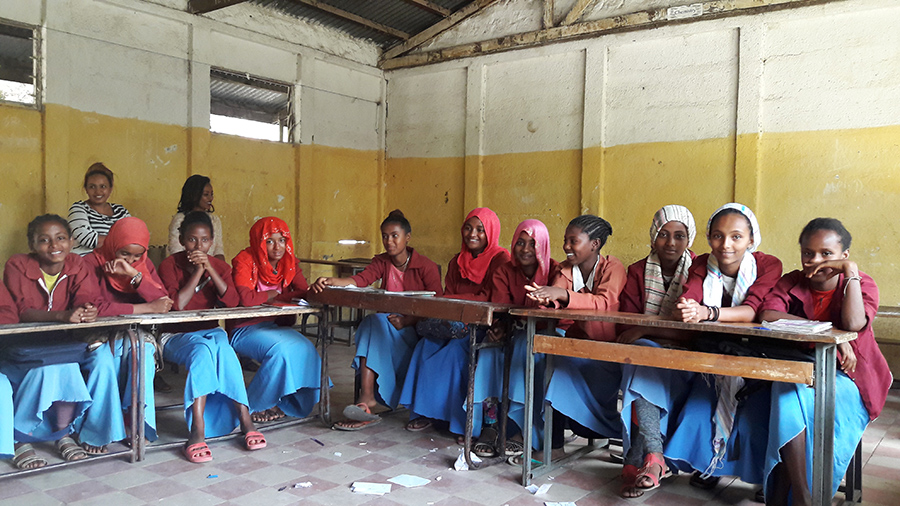In impoverished communities in Ethiopia, irregular labour migration to the Middle East is the norm for young women and girls. Driven to migrate by employment opportunities abroad, many of these young women face a high risk of abuse, exploitation and falling into situations of slavery. Most school-aged Ethiopian girls face peer pressure to migrate, and many don’t know enough about labour migration to make informed decisions.
The Freedom Fund’s Ethiopia Hotspot promotes safe migration for women and girls traveling to the Middle East for domestic work, and supports education and recovery services for potential migrants and returnees. Last week, I visited schools in northern Ethiopia to see how our partners were empowering adolescents to decide what’s best for them.
“Migration to the Middle East is everyone’s problem in my community,” said Samrawit, 14, whom I met during a visit to her school in a rural area of the Amhara region. “If everybody is involved then we’ll have an army of people sharing information and helping us making better decisions.”
In Samrawit’s isolated, rural community, every household has a family member who is or was a domestic worker in the Middle East. Yet, until FORUM started supporting her and her friends through a peer support group, there was nowhere they could discuss labour migration.
In this school, teenage girl peer leaders are trained to talk about labour migration, brokers, irregular migration and what the law says about migrating for work. During the session I attended, the two adolescent facilitators confidently led an hour-long discussion, organising group discussions and answering questions. Importantly, part of their role is to support their friends to build the life skills necessary to help them grow into critical, self-confident and assertive young women. These skills will allow them to properly assess their options and ask the right questions, including whether it is in their best interest to migrate for employment abroad.
In a town nearby, I participated in another session with a group of adolescents who were at the end of their training, supported by BPDO. When I asked them what they needed to learn to be safe and fulfilled young women, they answered that they needed to acquire the confidence and skills to make their own decisions and resist peer pressure. Specifically, they felt that learning about sexual and reproductive health would go a long way, as well as learning how to manage relationships with the opposite sex.
When asked what they would tell a friend who wanted to migrate as domestic workers, they answered that it was not their place to tell her whether or not to go. Instead, they would encourage her to think about the pros and cons and help her make an informed decision in which she considered all her options.
When I challenged them on whether they thought 14 was old enough to migrate abroad to work in the home of others, they agreed that it was probably too young. They said that girls at that age are not physically ready and their decision making is ‘not so good’. But, they concluded, we should not generalise, as it’s not helpful.
These discussions with about 30 of the several hundred girls and adolescents supported through peer group sessions left me inspired and impressed. These girls spoke openly about migration issues, seeking mutual support and watching out for each other. The facilitators showed great leadership, and they were all engaged. They understand the concept of migration and debate its various manifestations and nuances. More importantly perhaps, they also are starting to address the daily challenges faced by young women growing up in rural Ethiopia. In another school, the head teacher proudly shared that as a result of these peer groups, none of the 300 girls involved in sessions dropped out of school, a significant change from what he usually sees.
In Amhara, the Freedom Fund and our partners are working to prevent trafficking and keep those who migrate safe. This work goes beyond solely addressing migration issues and it is starting to show some very encouraging impact.
The Freedom Fund’s Ethiopia hotspot supports efforts to reduce the vulnerability of migrants and returnee women and girls to trafficking to the Middle East for domestic work. Read more about our hotspot here.



